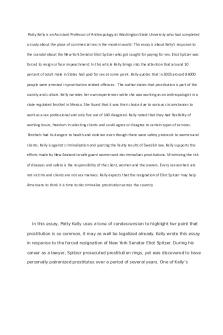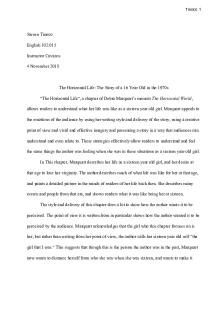Rhetorical Analysis - IN CLASS NOTES PDF

| Title | Rhetorical Analysis - IN CLASS NOTES |
|---|---|
| Course | Composition I |
| Institution | University of Houston-Downtown |
| Pages | 6 |
| File Size | 213.8 KB |
| File Type | |
| Total Downloads | 102 |
| Total Views | 136 |
Summary
IN CLASS NOTES...
Description
Rhetoric/ Rhetorical Analysis A rhetorical analysis essay is a form of writing where the author looks at the topic in greater detail and proves his standpoint, using effective and persuasive methods. In a broader sense, a rhetorical paper means 'writing about writing.” The main point is to create the informative text by dividing apart the words/phrases that the writer comes up with to reveal the persuasive techniques used to get feedback from the audience. An argument can be a text-written, spoken, aural, or visual- that expresses a point of view. Some theorists claim that language is inherently persuasive. Exploring all the occasions and kinds of arguments available will lead you to think about the audiences you are addressing and the specific ways you can appeal to them. Ethos, Pathos, and Logos are modes of persuasion used to convince audiences. They are also referred to as the three artistic proofs (Aristotle coined the terms), and are all represented by Greek words. Appeals: 1- Emotional appeals: pathos 2- Ethical appeals: ethos 3- Logical appeals: logos
1- Pathos
Emotional appeals, or pathos, generate emotions (fear, pity, love, anger, jealousy) that the writer hopes will lead the audience to accept a claim. In fact, they are very powerful tools for influencing what people think and believe. Authors tend to write their arguments that appeal to emotion, and research has shown us that we often make decisions based on just such appeals. - Using Emotions to Build Bridges: You may sometimes want to use emotions to connect with readers to assure them that you understand their experiences or “ feel their pain.” Some issues such as racism, immigration, abortion, and gun controlprovoke strong feelings and, as a result, are often argued on emotional terms. But even issues that seem deadly dull- such as reform of federal student loan programs- can be argued passionately when proposed changes in these programs are set in human terms. - Using Humor: Humor has always played an important role in argument, sometimes as the sugar that makes the medicine go down. You can slip humor into an argument to put readers at ease, thereby making them more open to a proposal you have to offer. - Using Arguments Based on Emotion It is a good idea to spend some time early in your work thinking about how you want readers to feel as they consider your persuasive claims. Authors use pathos to invoke sympathy from an audience; to make the audience feel what the author wants them to feel. A common use of pathos would be to draw pity from an audience. Another use of pathos would be to inspire anger from an audience, perhaps in order to prompt action. Pathos is the Greek word for both “suffering” and “experience.” The words empathy and pathetic are derived from pathos. Pathos can be developed by using meaningful language, emotional tone, emotion evoking examples, stories of emotional events, and implied meanings.
2. Ethos:
The ethical appeal means to convince an audience of the author’s credibility or character. An author would use ethos to show to his audience that he is a credible source and is worth listening to. Ethos is the Greek word for “character.” The word “ethic” is derived from ethos. Ethos can be developed by choosing language that is appropriate for the audience and topic (this also means choosing the proper level of vocabulary), making yourself sound fair or unbiased, introducing your expertise, accomplishments or pedigree, and by using correct grammar and syntax. During public speaking events, typically a speaker will have at least some of his pedigree and accomplishments listed upon introduction by a master of ceremony. Aristotle treats ethos as a powerful argumentative appeal. Ethos creates quick and sometimes almost irresistible connections between readers and arguments. We observe people, groups, or institutions making and defending claims all the time and inevitably ask ourselves, should we pay attention to them? Can we rely on them? Do we dare to trust them? Thinking Critically about Arguments Based on Character: Put simply, arguments based on character (ethos) depend on trust. We tend to accept arguments from those we trust, and we trust them (whether individuals, groups, or institutions) in good part because of their reputations. Three main elements – credibility, authority, and unselfish or clear motives- add up to ethos. To answer serious and important questions, we often turn to professionals (doctors, lawyers, engineers, teachers, pastors) or to experts (those with knowledge and experience) for good advice. Based on their backgrounds, such people come with their ethos already established.
Establishing Trustworthiness and Credibility: Trustworthiness and credibility speak to a writer’s honesty, respect for an audience and its values, and plain old likability. Sometimes a sense of humor can play an important role in getting an audience to listen to or “like” you. It’s no accident that all but the most serious speeches begin with a joke or funny story: the humor puts listeners at ease and helps them identify with the speaker. You can also establish your trustworthiness by connecting your own beliefs to core principles that are well established and widely respected. This strategy is particularly effective when your position seems to be at first glance, at least- a threat to traditional values. It is fine to be a rebel when you are on the right side of history. Writers who establish their credibility seem trustworthy. Also, speaking to readers directly, using I or you or us, can also help you connect with readers. You may also find that a more formal tone gives your claims greater credibility. In fact, whether you write an essay or present an idea, you are sending signals about your credibility, whether you intend to or not. If your ideas are reasonable, your sources are reliable, and your language is appropriate to the project, you suggest to academic readers that you’re someone whose ideas might deserve attention. Details matter: helpful graphs, tables, charts, or illustrations may carry weight with readers, as will the visual attractiveness of your text, whether in print or digital form. Claiming Authority: When you read or listen to an argument, you have every right to ask about the writer’s authority: what does he know about the subject? What experiences does she have that make her especially knowledgeable? Why should I pay attention to this person? How does someone construct an authoritative ethos? Writers establish their authority in various ways. Sometimes the assertion of ethos will be bold and personal. Other means of claiming authority are less dramatic. By simply attaching titles of their names, writers assert that they hold medical or legal or engineering degrees, or some other important credentials, or they may mention the number of years they’ve worked in a given field or the distinguished positions they have held. As a reader, you will pay more attention to an argument about sustainability offered by professor of ecology and agriculture at the University of Minnesota than one by your uncle Sid, who sells tools. But you will prefer your uncle to the professor when you need advice about a reliable rotary saw. Coming Clean About Motives:
When people are trying to convince you of something, it is important and natural to ask: whose interest are they serving? How will they profit from their proposal? Such questions go to the heart of ethical arguments.
3. Logos: The appeal to logic means to convince an audience by use of logic or reason. To use logos would be to cite facts and statistics, historical and literal analogies, and citing certain authorities on a subject. Logos is the Greek word for “word,” however the true definition goes beyond that, and can be most closely described as “the word or that by which the inward thought is expressed" and, "the inward thought itself" (1). The word “logic” is derived from logos.
Logos can be developed by using advanced, theoretical or abstract language, citing facts (very important), using historical and literal analogies, and by constructing logical arguments. As readers and writers and when dealing with arguments based on facts and reason, you need to first examine your own beliefs in particular facts and pieces of information: do you really know what you’re talking about or are you simply echoing what others you know say or think? Second, you need to become a conscientious fact- checker, digging deep to make sure claims are backed by evidence. In fact, most people prefer appeals to claims based on facts, evidence, and reason. Just make sure that the logical appeals you are using are factually correct and ethical as well. Persuasion based on logos is based on hard evidence, facts, statistics, surveys and polls and testimonies and narratives. Surveys and polls: when they verify the popularity of an idea or a proposal, surveys and polls provide strong persuasive appeals. They have many functions
such as helping politicians make decisions, they also can be important elements in scientific research, documenting the complexities of human behavior. They can also provide persuasive reasons for action or intervention...
Similar Free PDFs

Rhetorical Analysis
- 5 Pages

Rhetorical analysis
- 2 Pages

Rhetorical notes
- 9 Pages

Puppy Rhetorical Analysis
- 4 Pages

Rhetorical analysis -1
- 4 Pages

Bowling Dana Rhetorical Analysis
- 4 Pages

Rhetorical Analysis Essay
- 5 Pages

Textual Rhetorical Analysis
- 3 Pages

Rhetorical Analysis Final
- 5 Pages

In Class Notes - Sports
- 1 Pages

Rhetorical Analysis Prompt
- 2 Pages
Popular Institutions
- Tinajero National High School - Annex
- Politeknik Caltex Riau
- Yokohama City University
- SGT University
- University of Al-Qadisiyah
- Divine Word College of Vigan
- Techniek College Rotterdam
- Universidade de Santiago
- Universiti Teknologi MARA Cawangan Johor Kampus Pasir Gudang
- Poltekkes Kemenkes Yogyakarta
- Baguio City National High School
- Colegio san marcos
- preparatoria uno
- Centro de Bachillerato Tecnológico Industrial y de Servicios No. 107
- Dalian Maritime University
- Quang Trung Secondary School
- Colegio Tecnológico en Informática
- Corporación Regional de Educación Superior
- Grupo CEDVA
- Dar Al Uloom University
- Centro de Estudios Preuniversitarios de la Universidad Nacional de Ingeniería
- 上智大学
- Aakash International School, Nuna Majara
- San Felipe Neri Catholic School
- Kang Chiao International School - New Taipei City
- Misamis Occidental National High School
- Institución Educativa Escuela Normal Juan Ladrilleros
- Kolehiyo ng Pantukan
- Batanes State College
- Instituto Continental
- Sekolah Menengah Kejuruan Kesehatan Kaltara (Tarakan)
- Colegio de La Inmaculada Concepcion - Cebu




